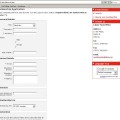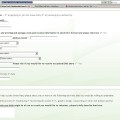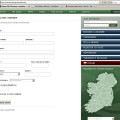A lot has been made of President Obama’s use of Web2.0 technologies in his election campaign. Irish political parties are falling over themselves to get on d’interwebby and send their tweets to twitter and make full use of the mygoogleyyoutubebospace.com to woo voters. After all, if you’re not in you can’t win.
Of course, to a great extent the local zeitgeist is missing the point about Obama’s win. It was not just the technology and the interactions via the web that got him elected. It was the very carefully planned and executed gathering of information about people and their interactions with the party and with the democratic process that helped guide strategy and drive the ‘machine’ to get people out and get them voting. Obama used the technology as a tool to ensure timely and actionable information that drove effective communication. Any idiot can set up a blog (hoisted by my own petard I think here), but mass engagement on a massively personal level requires high quality data so that you can execute your plan and achieve your objectives.
It’s just the same with businesses – the technology is one part of the equation, the people issues and the focus on the information is the magic essential that makes it all work. To put it another way, all the plumbing in the world won’t make nice tea if your water is full of effluent.
As I’m currently working with the IAIDQ to improve our web presence and get more active in having conversations with members and potential members via Twitter I decided to take a quick look around what the main parties in Ireland are doing thus far from the point of view of figuring out what the quality of their data might be and what their challenges probably are. I was also inspired by Graham Rhind’s post over on DataQualityPro.com about web data capture. My main area of focus is the ‘sign up’ pages for each of the parties as this is the opportunity to find out up front what people are interested in.
For full disclosure, I am a paid up member of one of these parties but rest assured I’ll put the boot in fairly.
Labour (Labour.ie)
My first thoughts looking at this page are *uurrgh – free text* 🙁 Free text fields are not a good indicator of potential quality data.
They’ve sensibly made your Given Name and Family Names (unfortunately called First name and surname here) and email and postal address fields manadatory. There is validation on the email address, which recognises “.info” as a valid domain (halleluijah – the number of sites that STILL don’t validate .info is horrendous).
However, the party has opted to capture postal addresses in a big free text blob. Oh dear. This would suggest to me that either:
- They have back office processes to parse and standardise this data so it can be used effectively to target members by constituency
- They reformat addresses on an ad hoc basis as required by manually rekeying
Either of these options adds cost and reduces the effectiveness of the information captured. Analysis of the data will take longer as it will need to be reformatted and cleansed each time (unless there is an ongoing scrap and rework process in the background). It doesn’t take too much extra effort from a coding point of view to put some basic structure on the addresses as people enter them.
The registration page also asks you for your areas of interest in the party and politics. This is a single free text field with just one line of text available. OGG (as Charlie Brown would say if he was a tweenager today – “oh good grief”). How precisely do Labour quickly align people with issues and campaigns? Is this field linked to some sort of parsing process (automated or human driven) where this information is processed out? Does this affect their speed to respond to members and pick up people with skills they might be able to use? What speed to react advantage might they be losing out on here?
Let’s not dwell on this much further only to ask why they haven’t taken advantage of capturing the mobile phone number to ask if they can sms you as well as email you?
DOBlog ranking: Not great. Great scope for improvement with some proper planning and execution.
Fine Gael (Finegael.ie)
OK, this one looks a little more promising. At least the postal address field is broken out into more than one text field. Oh… hang on… no. I take
that back. Two text fields does not a structure make. But at least they take the time to capture the constituency you want to be associated with (I didn’t see that on the Labour.ie site but may have missed it).
But again… *nggggaahhh* with the free text for fields that hold gold dust and gems of information about the people who are signing up for you. The comments I made about the Labour Party hold here as well. A colleague in the IAIDQ once shared the following mantra with me:
“Free text fields usually aren’t”
There is bound to be some structure or key things that the party wants to find here. Surely they could break them out into a structured pick list to improve the quality of the information they have, not just the quantity of it?
DOBlog rating: Better than Labour but still a recipe for poor quality information.
The Green Party (Greenparty.ie)
Bob Dylan may have sang “How many roads must a man walk down before they call him a man”, but I was humming “How many links to I need to click to join the Green Party” there were so many clicks to get here. That said, once I got there, their registration form was not entirely disappointing from a data quality point of view.
For a start, they (alone out of all the political parties) avoided the trap of First Name/Surname which can bugger up data when dealing with cultures who put their family names first either all the time or when filling in forms (like Asian cultures, and some parts of Eastern Europe). The Greens went for a nice fudge of “first name” and “Family Name(s)” which is a step in the right direction.
They structured the address over two unstructured fields, with a drop down list for Counties and Dublin post codes and a nice special field for any members from foreign soils who actually have post codes (co-incidentally the Government Minister currently responsible for the non-introduction of postcodes in Ireland is a member of the Green Party). This small investment in structure means that (hopefully, if they haven’t burgered up the backend on this) the Green Party are able to very easily slice and dice their membership data to see where they have ‘boots on the ground’ and where they might be exposed. Basic, but good.
They also capture information about an applicant’s country of origin/nationality, but with out saying WHY they want to know that. Not an information quality issue per se, but I’d question whether that question might result in excessive information for the stated purpose in the context of Data Protection. As this is a required field I would suspect that people who object to answering the question might fudge the answer. Bear in mind that many immigrant communities might be fearful of giving detailed information about their origins to ostensible authority figures in a host country.
What they do well that none of the other parties looked at so far have done is to pick out some ‘hot button’ skill areas that they need bodies for and make them straightforward tick boxes so Green Party activists can raise their hands and take part in activities such as “monitoring the media” or canvassing. Again, this is structured data which would be straightforward to work with and allows the Green Party to make use of the information they are capturing. Free text is used just for stuff they haven’t thought of yet.
[updated]
DOBlog rating: There has been some clear planning here as to what information they need to capture and what uses they would like to put it to, as opposed to a desire to have summat on d’interweb. There probably needs to be some greater clarification on what some of the information is to be used for which might contribute to improving quality. Otherwise a good effort. Having thought about it again in the context of Graham Rhind’s comment below, I’ve downgraded the Greens to “good planning, shame about the execution”.
Fianna Fail (fiannafail.ie)
Fianna Fail made a big deal earlier in the year of getting a company who had done the technology piece for Obama to rejig their website. Well done. So I was eager to see how the site’s registration page reflected the obvious intense and intent learnings that would have come from the US company’s involvement.
Hmmm… first off, the site looks clean and snazzy. The zen of data capture is clear here, with only items that are required being requested and lots of whitespace. Mandatory fields abound.
Gone is the land line phone number (sure we have more mobiles than people in this country), reducing the amount of fields you have to fill in. Emphasis is placed on the email address as the means of contact. The postal address is structured into:
- Two general address lines (good)
- A city (ooookkkkkayyy)
- A postcode (ehhh… guys?)
- A country.
WTF… what about COUNTIES? And City and Postcode are mandatory fields. If one assumes that City= County then you find yourself faced with a free text field for Counties and cities. So “Co. Test” should kick out on the validation, surely. It doesn’t.
Likewise there is no validation on the telephone number and you are told to put in “N/A” instead of putting in a post code (did somebody forget we don’t have them? It is simply NOT good practice from an information quality point of view to FORCE people to create poor quality information that you then have to go and clean later on. I can imagine the analysis now “Jeez, we’ve got to get moving on the people in postcode N/A – there’s lots of interest in us there”).
The process then (very cleverly) prompts you to sign up a friend… I bailed out at that point.
No effort made (at that point in the lifecycle of a FF member) to find out if they know anything or can do anything of use to the party.
10/10 for slick and shiny web presences, with the usual suspects of Twitter, Facebook and Youtube featuring in the footer of the site, but I would question the quality of the information that would exist on the database behind this site and its ultimate effectiveness in driving a smart and information-enabled election campaign.
DOBlog rating: Very poor. They seem to have spent money to reinvent their web presence and sexify it without thinking for a second about the quality of the information they are going to need to capture and use.
Conclusion
The Greens, surprisingly, are the most astute in terms of how they have designed their membership sign up form to capture information they can quickly use to effectively engage with people from their database. Yes, FF may have a cunning plan involving Twitter and such like, but the Greens are the only party that could, on the basis of their registration pages, run a query and find 100 people willing to canvas in the Dublin 5 area.
Labour and Fine Gael have a way to go but with some decent planning and an information quality centered approach to that planning and execution of that plan they could improve greatly.
Fianna Fail are a disappointment. Very basic mistakes, in my view, create a web form that is confusing for the person trying to register and results in plain crappy data on the back end. Unless they have spent even more cash on the back end to undo the duffing up of their data.
With the focus coming more and more on how political parties can engage with their contituencies and secure votes using Internet based technologies, there is a risk that the political zeitgeist will get caught up in the technology and lose focus on the most important element required to win elections – Information on who your constituents are, what matters to them, and how they can help you help them most effectively. Everything else is just plumbing that helps you make use of that information in a more timely (and perhaps more automated) manner. But if the quality of the information is poor, through poor design and poor planning of information capture, then the investment and effort involved will not be justified come election day.
Information Quality is, ultimately, a measure of how well the information enables a knowledge worker (a party worker, a constituency activist, a head office strategist) to achieve their objectives. Having looked at how our political parties currently gather information on their members, there are grounds for concern in most about the ability of their information to meet their expectations without heroic efforts from backroom staff to reformat, cleanse, and repurpose that information.
It’s the information, stupid.




Well, Daragh, I’m delighted to be your inspiration 🙂
I’m currently working on an e-book about web forms for international name and address information (watch this space), and one thing I’ve been picking up in my research is that sometimes data quality has to take a back seat (did I REALLY say that?). For political parties, the aim is to coax the voter through the form and signed up as a paying member.
Data quality can hang.
Clearly and ideally, thought should be given both to what will make the voter sign up without sacrificing data quality.
You’re right, none of these forms are much cop, but it’s strange how different people experience them in different ways. Your winner, the Green Party’s form, had me rolling in the aisles. I would have bailed out long before reaching the “send” button. Asking me for my Dublin postcode (not a postcode, as you correctly state), and then only later asking me for my country? Putting two address fields next to each other horizontally, in total contrast to how it would appear in an address block?
I won’t bore you with comments on each form, but hopefull by the end of April everybody will be able to read my opinions about similar forms 🙂
Graham
Graham
I look forward to reading your ebook and will be recommending it widely as you are the gu’vnor in these matters IMHO.
Your comments on the Green Party website are spot on. I probably fell foul of the halo effect a little there – the fact that they were capturing ANY information in a structured way was such a refreshing innovation compared to their peers. I think it is fair to say that the quality of ‘designed-in quality’ on these sites is poor and one can only assume a small army of back office staff are deployed to make sense of the information.
Daragh,
Excellent post!
I have had some direct experience with the grassroots advocacy of working on the campaigns of local politicians – and I have always used the cliché that “all politics are local.â€
I was impressed by President Obama’s use of Web2.0 technologies and I applaud your accurate explanation of why the strategy was successful. It worked not simply because Web2.0 was used but because it was used effectively based on careful planning and execution.
I also agree that the campaign’s Web2.0 success provides a great model for our industry.
I continue to be impressed with your ability to use lessons from everyday life to make information quality issues more relatable.
Keep up the great work!
Best Regards…
Jim Harris
Pingback: Setting tone from the Top | The DOBlog